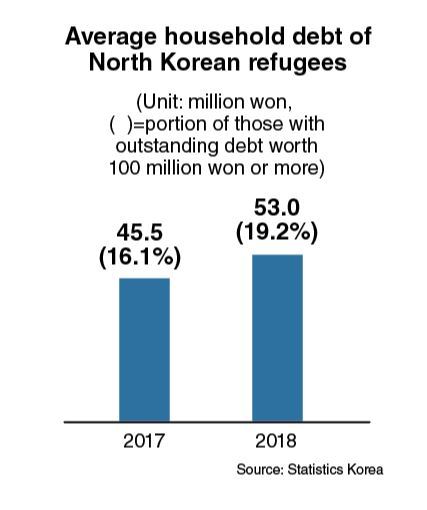[News Focus] North Korean defectors see household debt surge
Refugees’ debt grows faster than average household debt of South Koreans
By Kim Yon-sePublished : Jan. 30, 2020 - 10:31

SEJONG -- The number of defectors from North Korea over the past decades came to 33,300 in the South -- 9,300 men and 24,000 women -- as of December.
The Ministry of Unification’s data showed that the number of North Korean defectors has increased since 2002, while the prior combined figure was 1,990.
A noteworthy point is that the number of female refugees is far outstripping men’s tally at the current stage -- it was below 50 percent before 2002.
The percentage of women posted 83 percent in 2017, 85 percent in 2018 and 81 percent in 2019 on a yearly basis, while their collective portion has reached 72.1 percent so far.
Concerning the shrinking portion of male defectors, some market insiders cite the relatively tighter job conditions for men in the services sector in South Korea. But their arguments have yet to be verified.
For their stable settlement in the South, the Unification Ministry has carried out a mid-term project for job creation for defectors and their households in coordination with private enterprises and the Ministry of Employment and Labor.
But data from Statistics Korea showed that a large portion of defectors are burdened with basic expenses for life -- 23.1 percent of them picked food costs as the primary burden.
Their primary burden was the same irrelevant of the period they have stayed in the South -- 23.5 percent of those, who resided here for more than 10 years, picked food spending, while 22.5 percent of those, who have resided here for less than, also expressed difficulty over it.
Most of all, their household asset status indicates their aggravated difficulty in livelihood with outstanding debt growing fast in recent years.

The average household debt of North Korean defectors came to 53 million won ($44,900) as of 2018 (the latest available figure), up 7.5 million won from the previous year.
The figure for the group is inching closer to the average household debt held by South Koreans, which posted 70.9 million won in 2017, 76.6 million won in 2018 and 79.1 million won in 2019.
“During the 2017-2018 period, the debt growth of 16.4 percent among defectors far exceeded the figure (8 percent growth) for an average South Korean household,” said an analyst in Seoul.
Furthermore, the percentage of defector households with outstanding debt worth 100 million won or more increased by 3.1 percentage points from 16.1 percent in 2017 to 19.2 percent in 2018, according to Statistics Korea.
By age, those in their 40s topped the list as their average household debt posted 59 million won, followed by those in their 30s (57.8 million won), those in their 20s (47.6 million won) and those aged 15-19 (47.1 million won).
Older age groups were saddled with smaller debt -- 37.6 million won for those in their 50s and 28.7 million won for those aged 60 or over.
The data showed that the debt was growing in proportion to their residence period -- 22.2 million won for those dwelling less than three years, 45.5 million won for three-five year period, 53.3 million won for five-10-year period, and 58.7 million won for those here for 10 years or more.
By household size, four-member households topped the list with 70.5 million won in debt, trailed by two-member households (56.3 million won) and five-member households (52.7 million won). The figure was the smallest among single-member households at 33.9 million won.
By region, the debt for refugees residing outside the Seoul metropolitan area (61 million won) outstripped the figure for dwellers in Seoul-Gyeonggi Province-Incheon (48.8 million won).
Their debt is presumed to have comprised loans for living expenses, mortgages for apartments, educational spending and self-employed businesses, according to a survey by the Korea Hana Foundation.
By Kim Yon-se (kys@heraldcorp.com)




![[Herald Interview] 'Amid aging population, Korea to invite more young professionals from overseas'](http://res.heraldm.com/phpwas/restmb_idxmake.php?idx=644&simg=/content/image/2024/04/24/20240424050844_0.jpg&u=20240424200058)











![[KH Explains] Korean shipbuilding stocks rally: Real growth or bubble?](http://res.heraldm.com/phpwas/restmb_idxmake.php?idx=652&simg=/content/image/2024/04/25/20240425050656_0.jpg&u=)

